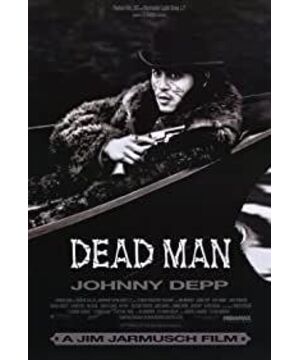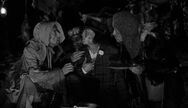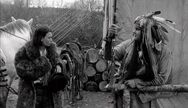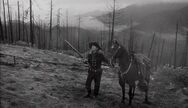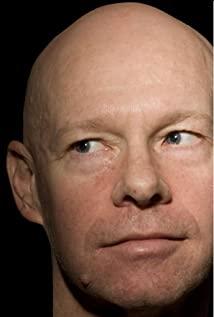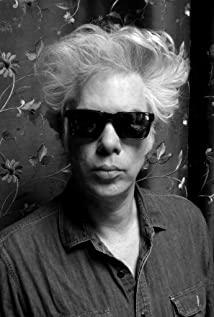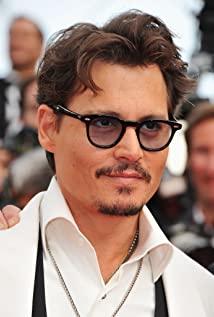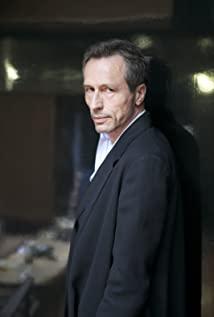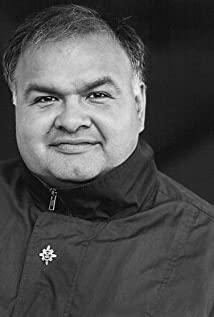The whole film seems to have been around the theme of "death". The film quoted Henri Michaux's "It is preferable not to travel with a dead man." from the beginning. I think this film is called "Dead Man" for two reasons: First, William Blake, the character played by Johnny Depp, was shot at the beginning. He is a dying man, and he is destined to die soon; It is that he has the same name as the British poet William Blake. In the film, he also thinks he is the great poet, consciously or unconsciously, and the poet has been dead for many years.
In my opinion, "Dead Man" is a poetic film, with poetic colors, poetic style, and poetic rhythm-black and white pictures, Mercedes-Benz trains, silent carriages, and the noise of wheels. Irregular neighing guitar, all of this appears irregularly and without warning, always on the road, there is no turning back, there is no end in sight except death. Being outside of the mainstream, and seemingly deeply philosophical to explore, this may be the poetic style that Jim Jarmusch is pursuing.
In the 1990s, few directors seemed to be able to shoot black and white films, and black and white films inevitably conveyed a sense of strangeness and tranquility. The black and white world in "Dead Man" is quiet to death, only Neil Young's dreamy, blurred, weird, desolate and abrupt music, like a greasy and cold snake, walks through the entire film, accompanied by scattered sharp gunshots, which makes people can't help but Ask: Is this a world or a hell? Jim Jarmusch uses black and white to create a distant and unfamiliar world, and uses outrageous and absurd plots to subvert the idealized imagination of the American West.
The black and white world in the film is heartbreakingly cold. When the gun is fired, someone will always fall down, but both the spectator and the person involved are expressionless, as if the world was born like this. The hired killer cleans up the two companions and gnaws at one's arm disgustingly. Everything is so ridiculous, the soul falls to hell. Like the people in the film, I felt stunned. When death came to me, it seemed as if it was just a mechanical and hopeless move to raise my hand and shoot. It doesn't matter where the bullet is shot, it's just that there is a bleak and faint fear besides the drifting eyes. When William Blake saw the flower girl slumped in his arms, he instinctively took out the gun from under the pillow to fight back. The hands that had never held a gun before trembled and fell completely into fate.
In this movie of killing and being killed, black blood flows from the white chest of the flower seller, from the wound of the blown head of the killer, and flows down the arm of William Blake into the river...blood There was no sound and no shocking color, just like the empty eyes of William Blake, who was inexplicably involved in the sudden fate of fleeing, when he killed people with a self-defense machine, numb and slow.
There is a symbolic and symbolic scene in the film-William Blake, who was wounded and killed, stumbled all the way into an escape career, saw a young deer shot and killed by the side of the road. He moved slowly, smearing deer blood with his fingers on the wound on his chest, and then on his face, lying down slowly and cumberly, sleeping with the deer. The camera was shot down from the air. In the wild woods, a man and a deer were nestled, just like a pair of children abandoned by God.
The bullet that was not taken out is very subtle. It is close to the heart, it is life threatening, it passes through the body of the flower girl into William Blake's chest, and there is nothing to do with it. William Blake's chest aches after every gunshot, like a long sigh and a mute cry for desolate fate. It is the boundary between the life and death of William Blake, and the middle ground between the two worlds. Before it, the cautious accountant has been deleted from the world’s guestbook; after it, the man who fell into the wheel of fortune became the eyes of the Indians. The dead poet William Blake. At that moment, whether he died or was still alive, it was no longer true. Not only William Blake, we make many decisions that lead to death every day, but we just escaped one by one by luck. One day, we will also start that journey without knowing it, the true journey to death. I remember that after the badly injured William Blake fell down the window, a shooting star passed by, and a lot of paper flowers. That day, under Nobody's guidance, he transformed into the poet William Blake, and calmly asked the killer who came after him: "Do you know my poem?" Then he shot. Poems and guns, perhaps the soul of the American West?
At the end of the film, William Blake was shot again, seriously injured. Nobody rowed him to the camp of the Indians. Nobody cried and put him on the funeral boat as a soul to rest, and sent him to the soul's home. The boat floated to the sea with William Blake. At this time, the fiercest assassin caught up with Nobody and attacked Nobody. The strong Nobody turned around and died with his opponent. William Blake could only watch it all. In the sea, he drifts to an unknown distance. In the last shot of the film, his boat approaches a deserted beach. At this time, the fate of the protagonist is no longer important, because he was a "dead man" at the beginning.
We can always perceive our true existence exactly before we die, and we are always passing everyone on our way to the other side. The color of death is so simple, full of loneliness and forgetfulness, just like another translation of the film "Do you see the color of death".
Johnny Depp’s acting skills are as impeccable as ever. The things he conveys in his eyes are slowly changing, from a small accountant who wanders for work to Nobody’s spiritual idol, from a real living person to death, Johnny Depp showed his versatility-he can be elegant or crude; he can be clear and simple, but also profound...Hollywood is probably hard to find an actor with a black atmosphere like him.
Few people are willing to make Western films black, or in other words, very few people can make Western films black, and Jim Jarmusch is an exception. "Dead Man" may be such a movie: it puts the "Western Spirit" in the traditional sense on the scale of criticism, and the pioneering spirit of the West is ruthlessly mocked. In the film, the "barbaric" Indians became the representatives of civilization advocating poetry, while the "pioneer" whites were reduced to beast-like predators. The tone of the film is humor followed by sadness, which makes this film Not only a poem from a western film, but also like an elegy to a western film.
View more about Dead Man reviews


